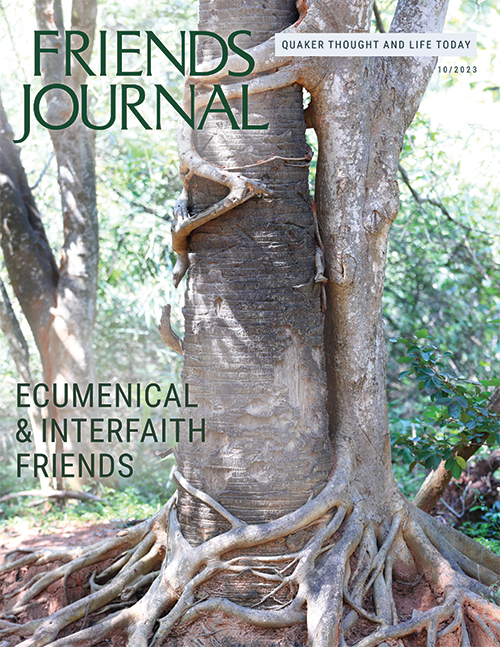Shaping our meetings, nurturing our journeys
Thanks to Olivia Chalkley for writing “Young Adults Want What Early Friends Had” (FJ Sept.). At my first Friends General Conference Gathering, I took a workshop named “George Fox and the Bible,” where my Southern Baptist education helped me see the roots of Quakerism. We compared Fox’s words in his journal with passages in the King James Bible. I was the only one in the workshop who had read and studied the Bible. It’s wonderful to know you are working with the School of the Spirit now.
Mary Ann Downey
Atlanta, Ga.
Yes! Some of us older, “experienced” Quakers in the liberal tradition also want this deep and personal knowledge of and relationship with Jesus, the Christ Spirit, and to follow where that leads us in our faith and practice. We want to be able to study and talk about it and our experience freely. We may be “Convergent” Friends embedded in Liberal meetings and hesitate to be upfront about where we are in our faith journey for fear of stepping on the toes of those Friends who are refugees from other traditions (I feel tenderness toward these Friends). So how to shape our Liberal meetings to serve and support the refugees, while also nurturing the journeys of those of us who need the deep grounded-ness of spiritual forbears in Quakerism? I hope your generation explores and develops some answers for yourselves, and that your search inspires others of us to search with you.
Lesley Laing
Monteverde, Costa Rica
Although I sympathize with people’s desire for what Luke Timothy Johnson calls “clarity and certainty,” there is very little in life that is clear and certain. One book that helped me sort through things (and what could help young people sort through them) is Quakerism: A Theology for Our Time by Patricia A. Williams. Williams treats George Fox, Robert Barclay, and the early Quakers with the respect they deserve, but she pulls them into the twenty-first century, where we need them to be. I’ve always wanted to ground myself in Barclay but have been put off by the old style of English; even the translation of Barclay into modern English was off-putting because of Barclay’s clear and certain beliefs in things that aren’t clear and certain. Williams’s book was a godsend.
William Marut
Glastonbury, Conn.
Olivia Chalkley makes a strong case for our faith and faith community to make demands on us, lest we be mired in complacency. Yet for some reason I find myself bristling at the extractive, dour energy implied by the word “demand,” and much prefer the idea of being agreeably led by the example of those who exceed my current level of zeal. I can easily become inspired by those whose Inner Light glows more brightly, motivated by joy and love rather than by a sense of obligation. In the words of Saint Paul, “Every man according as he purposeth in his heart, so let him give; not grudgingly, or of necessity: for God loveth a cheerful giver.”
Robert Dreyfus
Swarthmore, Pa.
Hair the color of clouds
Annie Bingham’s words are a breath of fresh air filled with the Spirit in these times when kids who were “closed in” during the pandemic years are struggling with mental health (“Seasonal Quakerisms,” FJ Sept.). Your friendship to your peers in building community and persistence to stick with it are welcome in these times of growing and maturing. Please keep on. And when the Spirit provides the occasion, teach those of us with “hair the color of clouds” (to paraphrase Annie’s description) how to connect across generations.
Don Crawford
Monteverde, Costa Rica
Good third eye, Annie Bingham! I’m used to the concepts of totem animals, spirit guides, and familiars as elements of spirituality, but I never dreamed that a pet rock could be “a compact, pocket-sized place of worship.” And now, being reminded of Luke 19:39–40, that rocks can generate (and speak from) spiritual energy, I have a whole new family of possibilities around where to channel the flow of chi from the One who created the universe.
Bennett Rutledge
Centennial, Colo.
Staking a position
Katharine Jager’s article moves me (“Who Gets to Be Safe? Struggling to Find Unity on Gun-Free Zones,” FJ Aug.). It brings me pain and sorrow that we live in a world and in American society where her sons have faced racism, been “othered,” and have grown up learning how to “behave” when around law enforcement—all things that White children of their age have not experienced. As people of humanity and as people of faith, we recognize the inherent equality of all persons in the eyes of the Divine. We can and we must do better. I am thankful to Katharine for sharing her story, and I am thankful to have the perspective of a White Friend parenting young Black men in America.
William King
White River Junction, Vt.
I feel such grief reading Katharine Jagar’s article. I grieve for the very realistic fear Katharine has for the safety of her sons. I have such sorrow for the absence of support her family should have received from other members of her meeting, both while they advocated for a sense of safety and after they left.
And I grieve for the people of Texas (and so many other states) who find themselves in an environment where guns appear to be a necessary presence in their lives, despite all the evidence of the damage they do, physically and emotionally.
Many of our meetings fall short in creating a loving and mutually supportive community of faith, grounded in an experience of recognizing God in our relationships with others. But we must keep trying—“let us see what love can do.”
Barbara Horvath
Toronto, Ont.
Quakers are so worried about staking a position. We are often operating from a scarcity mindset. I know of a Quaker meeting with no less than three signs in the foyer about not leaving stuff unattended because the meeting previously had thefts when the building was open to public use. What are we saying to guests about safety when we are more willing to have signs like that but not about banning guns? We are letting our feelings of being scared or not offending take over our decision making rather than being willing to make bold statements about our faith and what we hold most dear.
Greg Woods
Minneapolis, Minn.
I hope this article results in a deep discernment in the Friends meeting mentioned, and in Friends meetings everywhere. How complicit are we in systemic and pervasive racism? How much are we willing to weaken our testimonies in order to be accepted by the greater society?
Amy Cooke
Grass Valley, Calif.
Spicy reactions
Religion is about communication, and communication is about language, and language involves the use of metaphor (“Pointing to the Moon: SPICES Testimonies and the Biblical Roots of Quakerism” by Gene Hillman, FJ Aug. online). The truth that religion is attempting to communicate derives from a personal encounter with the Divine, and trying to communicate that experience to others is indeed beyond words; to be successful requires that both parties are of the same culture and language. If one believes (is convicted) that Divine Spirit (“Inner Light”) is the essence of God that manifests in the world and in human beings as the source of kindness, compassion, patience, caring, and hope, then that leads to a faith that requires one to emulate this as a reflection of God’s attributes in our lives. My peripheral association with Quakers from attending Friends’ meetings for worship has led me to believe that Quakers do indeed try to emulate this.
Bill Pastor
Kirkland, Ohio
When I became a convinced Friend in 1968, the “C” of SPICES stood for “continuing revelation” according to my memory. That is definitely more distinctively Quaker than “community,” which most religions profess.
Mike Fallahay
Indianapolis, Ind.
Hillman states that “Quakers were considered to be radical Puritans.” Were they? By whom? Not the Puritans, who had very mixed feelings about Friends, up to and including executing us. There are various ideas about what early Friends “were.” These seem to me to be motivated more by what the author wants contemporary Friends to be than by what early Friends and their contemporaries thought. Does the author want us to have always been Bible-believing, charismatic congregationalist Christians? Or does the author want us to have always been an extension of a continental European Anabaptist movement into the English-speaking world? Unitarian Universalists avant la lettre? Polysemous mystics? Whatever.
Our Society certainly grew out of the same religious and political turmoil of the English Reformation and the Wars of the Three Kingdoms, as did the Puritans and many others. But that doesn’t make us the same.
Keith Braithwaite
Glossop, UK
Animal consciousness and choice
I appreciate hunter Timothy Tarkelly’s article, “Allowable Diversions” (FJ Aug.). My father was a hunter, and so were my aunts and uncles and sometimes my mother. What they brought our families fed us all well, as did their vegetable gardens. They were not Quakers, but all honored Nature, the Earth, the animals, the forests, the streams. We of the next generation chose not to hunt, and they did not criticize our choice. We have much to be concerned about where the use of the wrong guns or the wrong methods is concerned, but I hope we all heed the care that the hunter may be taking, as Tarkelly describes and as he practices.
Rosalie Dance
Baltimore, Md.
Hunting today is not just choosing a tradition or sport in which to participate or reject. As a Quaker I feel the great importance to recognize that each animal is a conscious individual, experiencing and caring about their own life and safety, the basics of living that we humans also feel. Each individual animal, whether our pet dog, a mouse, rabbit, robin, eagle, horse, deer, or bear, consciously experiences their lives with the basic cares that evolutionary survival has given us all: raising the young in safety; finding adequate sources of food; a safe location to live and sleep; social interactions with others in their species; avoidance of pain, danger, and harm. Each animal is a conscious individual self, experiencing basic life harms and dangers, and caring about well-being. Respecting this reality, I surely hope to do no harm.
Steve Willey
Sandpoint, Idaho




Comments on Friendsjournal.org may be used in the Forum of the print magazine and may be edited for length and clarity.